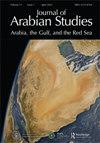Space Science and the Arab World: Astronauts, Observatories and Nationalism in the Middle East
Q1 Social Sciences
引用次数: 2
Abstract
gency bargaining (p. 93). Saudi overtures to Khatami are explained in terms of long-term strategic calculations, along with deepening irritation at Washington (p. 109). The notable improvement in Saudi-Iranian relations that took place in early 1998 occurred because “both countries were facing economic problems due to a very low [world] oil price and were anxious to cooperate to solve these difficulties” (p. 117). On the other hand, the unprecedented bilateral security agreement that was signed in April 2001 might well have been connected to struggles between the ministry of defense and the ministry of the interior (p. 119), although evidence for this contest appears to be drawn from a competing study. It has becomecommonplace to grouse that the existing scholarship on foreign policy in theMiddle East and North Africa ignores domestic determinants, and overemphasizes the importance of leaders’ idiosyncrasies and systemic circumstances. Fahad Alsultan and Pedram Saeid echo such complaints and promise to give us an alternative perspective that highlights a wide range of other independent variables. Nevertheless, their account does little to push things forward conceptually, and the evaluative framework that is presented at the outset vanishes from the ensuing narrative.空间科学和阿拉伯世界:中东的宇航员、天文台和民族主义
代理议价(第93页)。沙特对哈塔米的示好被解释为长期战略考量,以及对华盛顿日益加深的愤怒(第109页)。1998年初,沙特与伊朗的关系出现了显著改善,因为“由于[世界]石油价格非常低,两国都面临经济问题,并急于合作解决这些困难”(第117页)。另一方面,2001年4月签署的前所未有的双边安全协议很可能与国防部和内政部之间的斗争有关(第119页),尽管这种竞争的证据似乎来自一项相互竞争的研究。抱怨中东和北非外交政策的现有学术忽视了国内的决定因素,并过分强调领导人的特质和体制环境的重要性,已经变得司空见惯。Fahad Alsultan和Pedram Saeid回应了这样的抱怨,并承诺为我们提供另一种视角,强调其他广泛的自变量。然而,他们的叙述对推动概念的发展几乎没有什么作用,一开始提出的评估框架也从随后的叙述中消失了。
本文章由计算机程序翻译,如有差异,请以英文原文为准。
求助全文
约1分钟内获得全文
求助全文

 求助内容:
求助内容: 应助结果提醒方式:
应助结果提醒方式:


